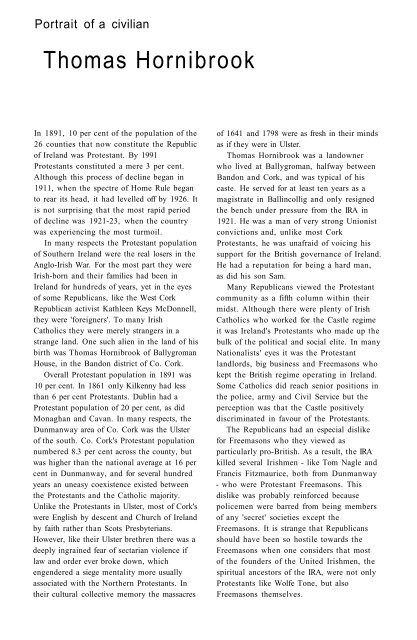Create successful ePaper yourself
Turn your PDF publications into a flip-book with our unique Google optimized e-Paper software.
Portrait of a civilian<br />
Thomas Hornibrook<br />
In 1891, 10 per cent of the population of the<br />
26 counties that now constitute the Republic<br />
of Ireland was Protestant. By 1991<br />
Protestants constituted a mere 3 per cent.<br />
Although this process of decline began in<br />
1911, when the spectre of Home Rule began<br />
to rear its head, it had levelled off by 1926. It<br />
is not surprising that the most rapid period<br />
of decline was 1921-23, when the country<br />
was experiencing the most turmoil.<br />
In many respects the Protestant population<br />
of Southern Ireland were the real losers in the<br />
<strong>Anglo</strong>-<strong>Irish</strong> <strong>War</strong>. For the most part they were<br />
<strong>Irish</strong>-born and their families had been in<br />
Ireland for hundreds of years, yet in the eyes<br />
of some Republicans, like the West Cork<br />
Republican activist Kathleen Keys McDonnell,<br />
they were 'foreigners'. To many <strong>Irish</strong><br />
Catholics they were merely strangers in a<br />
strange land. One such alien in the land of his<br />
birth was Thomas Hornibrook of Ballygroman<br />
House, in the Bandon district of Co. Cork.<br />
Overall Protestant population in 1891 was<br />
10 per cent. In 1861 only Kilkenny had less<br />
than 6 per cent Protestants. Dublin had a<br />
Protestant population of 20 per cent, as did<br />
Monaghan and Cavan. In many respects, the<br />
Dunmanway area of Co. Cork was the Ulster<br />
of the south. Co. Cork's Protestant population<br />
numbered 8.3 per cent across the county, but<br />
was higher than the national average at 16 per<br />
cent in Dunmanway, and for several hundred<br />
years an uneasy coexistence existed between<br />
the Protestants and the Catholic majority.<br />
Unlike the Protestants in Ulster, most of Cork's<br />
were English by descent and Church of Ireland<br />
by faith rather than Scots Presbyterians.<br />
However, like their Ulster brethren there was a<br />
deeply ingrained fear of sectarian violence if<br />
law and order ever broke down, which<br />
engendered a siege mentality more usually<br />
associated with the Northern Protestants. In<br />
their cultural collective memory the massacres<br />
of 1641 and 1798 were as fresh in their minds<br />
as if they were in Ulster.<br />
Thomas Hornibrook was a landowner<br />
who lived at Ballygroman, halfway between<br />
Bandon and Cork, and was typical of his<br />
caste. He served for at least ten years as a<br />
magistrate in Ballincollig and only resigned<br />
the bench under pressure from the IRA in<br />
1921. He was a man of very strong Unionist<br />
convictions and, unlike most Cork<br />
Protestants, he was unafraid of voicing his<br />
support for the British governance of Ireland.<br />
He had a reputation for being a hard man,<br />
as did his son Sam.<br />
Many Republicans viewed the Protestant<br />
community as a fifth column within their<br />
midst. Although there were plenty of <strong>Irish</strong><br />
Catholics who worked for the Castle regime<br />
it was Ireland's Protestants who made up the<br />
bulk of the political and social elite. In many<br />
Nationalists' eyes it was the Protestant<br />
landlords, big business and Freemasons who<br />
kept the British regime operating in Ireland.<br />
Some Catholics did reach senior positions in<br />
the police, army and Civil Service but the<br />
perception was that the Castle positively<br />
discriminated in favour of the Protestants.<br />
<strong>The</strong> Republicans had an especial dislike<br />
for Freemasons who they viewed as<br />
particularly pro-British. As a result, the IRA<br />
killed several <strong>Irish</strong>men - like Tom Nagle and<br />
Francis Fitzmaurice, both from Dunmanway<br />
- who were Protestant Freemasons. This<br />
dislike was probably reinforced because<br />
policemen were barred from being members<br />
of any 'secret' societies except the<br />
Freemasons. It is strange that Republicans<br />
should have been so hostile towards the<br />
Freemasons when one considers that most<br />
of the founders of the United <strong>Irish</strong>men, the<br />
spiritual ancestors of the IRA, were not only<br />
Protestants like Wolfe Tone, but also<br />
Freemasons themselves.



